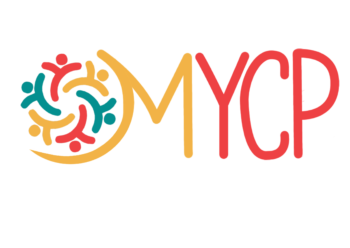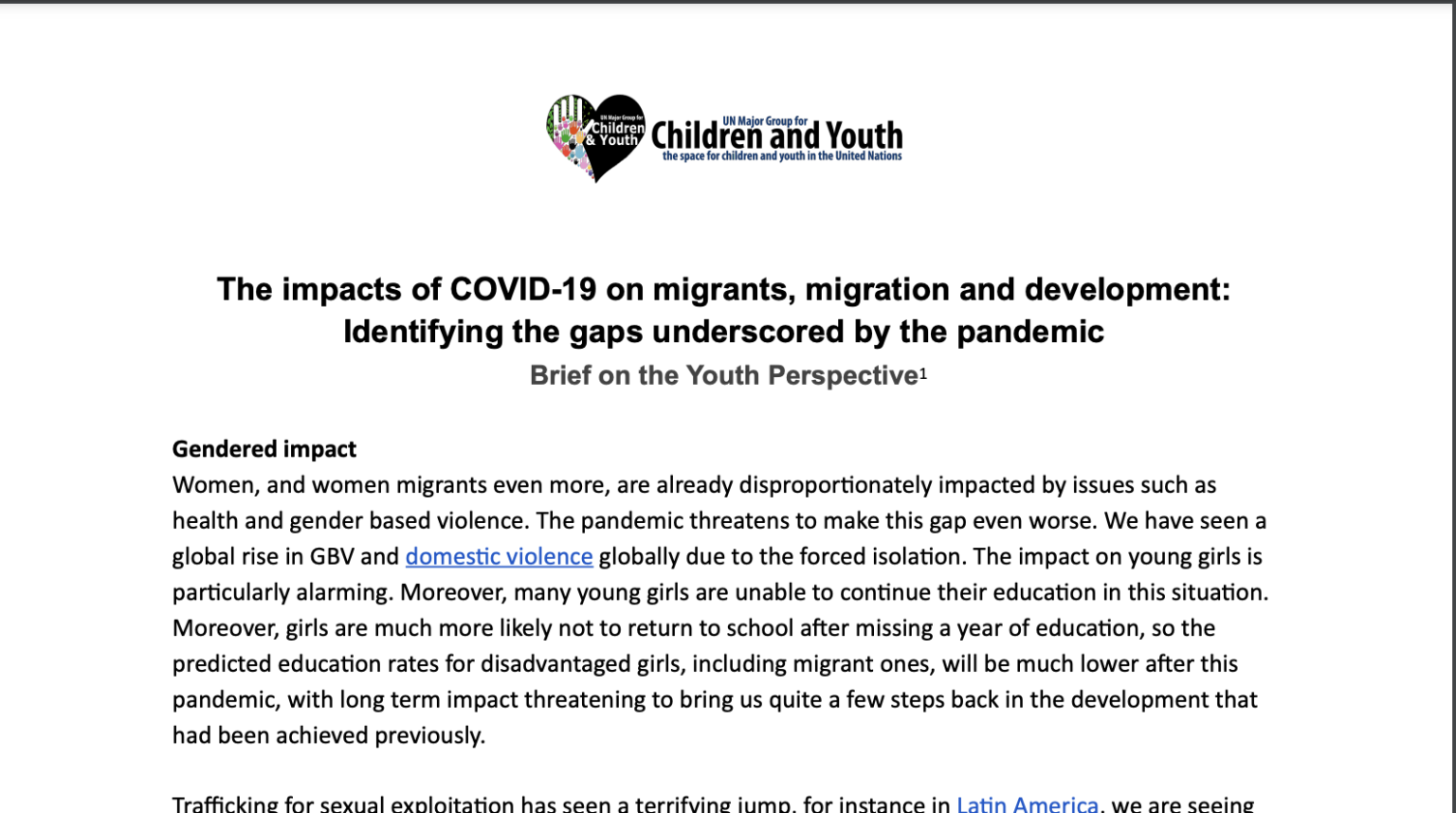Brief on the Youth Perspective
Gendered impact
Women, and women migrants even more, are already disproportionately impacted by issues such as health and gender based violence. The pandemic threatens to make this gap even worse. We have seen a global rise in GBV and domestic violence globally due to the forced isolation. The impact on young girls is particularly alarming. Moreover, many young girls are unable to continue their education in this situation. Moreover, girls are much more likely not to return to school after missing a year of education, so the predicted education rates for disadvantaged girls, including migrant ones, will be much lower after this pandemic, with long term impact threatening to bring us quite a few steps back in the development that had been achieved previously.
Trafficking for sexual exploitation has seen a terrifying jump, for instance in Latin America, we are seeing more women exploited and prices for services fall. States must integrate the prevention of violence against sexual and gender minorities in CoVid-19 response plans facilitated by governments including through functional helplines, and connection to services and information.
Apparent gaps in (de jure or de facto) access to social protection for migrants
Access to health, services, and human conditions has been harder for migrants during these times. Refugee and migrant camps have suffered incredibly during these times: cramped, overcrowded and don’t have a high hygienic standard which in turn makes the people of concern much more vulnerable to contract CoVid19. Living situations of migrant domestic workers have also worsened significantly, creating unsanitary conditions that result in infection spikes. In Bahrain, the government has taken the positive steps to urge employers to ensure that no more than five workers are housed in a room and that each worker should be three meters away from the other. In Kuwait, some workers were reportedly evacuated from their labour camps to alternative accommodation.
Also the working conditions have worsened, as the uncertain situation and general panic has led employers to be much more likely to exploit workers – whether it is by wage theft, lack of sick pay, or firing without any of the protections or compensations stipulated by law. An example is what we can see happened in Lebanon where there has been a mass exodus of ethiopian migrant workers dumped outside of their embassy due to employers not being able to continue paying them. Thus, this has put a massive strain on already struggling governments to return or help its citizens abroad who are now economically desolate.
An important issue has been that even when social protection measures are in place, migrants often do not make use of these services because their status does not allow, or they risk deportation, or because of lack of adequate information on their rights, such as what happened in the UK. The measure championed by Portugal to allow all migrants to access health services regardless of status is a great example of how to effectively address this gap. In Spain the government has worked closely with NGOs to provide adequate housing and pastoral care in smaller facilities which allows for integration. Qatar and Saudi Arabia are both offering free health care services to all migrant workers irrespective of their legal status in the country.
Unsafe migratory routes and conditions
A rise in irregular migration is to be expected when travel rules do not permit movement, leading to flows that are less likely to be controlled and properly integrated. More dangers present themselves as well during the journey, as exemplified for instance by the situation in Yemen for Ethiopian migrants stranded due to the pandemic.
Detention and deportations during COVID 19 also raise many issues in terms of safety and protection of the individuals, as well as separations of families. Alternatives should be more urgent than ever during such a time of crisis (for alternatives to detention see this report here).
Remittances
Countries such as Pakistan, Bangladesh and Ethiopia to name a few countries with high reliance on remittances of their migrant workers. Since lockdown and mass deportations and wages being halted remittances have dwindled. This in turn impacts the country’s development vastly, as money which would be going to families in remote villages will have stopped meaning the government and aid organisations have to fill the gap. The reliance on aid organisations have increased and organisations have seen their resources dry and stretched out. Under the GCM migrants have a right to adequate reintegration and support which need to be implemented during the enduring climate. Under the remittances in crises joint collaborative intergovernmental coalition on Remittances in Crises we see emerging best practices in a number of countries. In Jordan, The central bank relaxed regulations to allow Western Union to make remittances available online – allowing unbanked populations to access digital remittances.
Return and reintegration
A key concern of return is that both for daily wage workers who need to travel back to their villages or international migrants, the loss of their jobs impedes return altogether, such as what happened in India.
Xenophobia and stigma towards migrants
Xenophobia worsened during this pandemic, as foreigners came to be feared as bearers of the virus, even when they had been living in the same place for a long time. For instance, in Latin America seme Venzuean migrants experienced such a strong wave of xenophobia and economic crisis that they started walking back to Venezuelan from as far as Peru. Boats and migrants in Europe have been rejected because of CoVid concerns, leaving many migrants stranded, while other forms of travel were accepted. These narratives are dangerous as they lead to strained communities and leave everyone worse off.
Obstacles in the implementation of the Global Compact for Safe, Orderly and Regular Migration (GCM) and Sustainable Development Goals (SDGs)
Ensuring migrants are socially and economically integrated and that their human rights are respected is a prerequisite for people on the move to – first – not be left behind in the gains towards the 2030 Agenda, and – second – to significantly contribute themselves to the achievement of the SDG through their own skills and work. CoVid19 has taken the focus of governments and civil society away. But the situation of migrants has become more urgent, not less so. With every month of missed action, we are seeing heavy consequences on migrant populations, and also the huge loss of opportunity that the long-term impact will have on their ability to effectively contribute to their communities and the achievement of the SDGs. We are experiencing an enormous set back in the progress achieved so far towards the 2030 Agenda.
A note on education in particular: It is well known that children in migratory circumstances are held back in their education and miss a number of years due to this. During covid 19 this has further worsened due to schools closing which makes the children in a migratory setting in the covid-19 generation far more vulnerable, far less likely to own the necessary equipment, space, and time for distance learning, let alone parental help, and end up even more so left behind than their peers. This will have a long lasting, tremendously negative impact on the lives of these young people and their opportunities in the future, as well as their contribution to their host societies. This is also the same for older generations, for instance in Europe migrants have been unable to participate in language classes, health assessments, counselling.
Migrants can help us through this crisis. Migrants have been key workers during the response to the pandemic covering many essential workers positions, and some countries have also relaxed their rules to allow migrants to get their qualifications as doctors to be recognized so to help out with the critical situation of the health system. A leaner transnational recognition of skills that accounts for documentation difficulties in countries of origin is crucial to move closer to the achievement of the SDGs. Imagine what could be achieved if all migrants were allowed to practice their professions even without the threat of a global pandemic: we could achieve much more, together.


